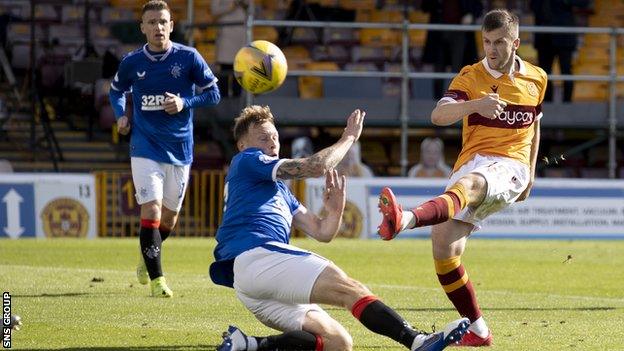Scottish Premiership: Should clubs forfeit points after Covid call offs?
- Published

Motherwell's last game was on 27 September - a 5-1 defeat by Rangers
For the second successive game week, Motherwell had a Scottish Premiership match postponed within 10 hours of kick-off due to an outbreak of Covid-19 in the opposition squad.
First Kilmarnock, then St Mirren had players forced into isolation and had to inform the SPFL they could not fulfil their fixture, with the game to be rescheduled.
It means the Fir Park side will have gone nearly a month without a game despite being able to play.
"I think there needs to be a law change that, if you can't fulfil a fixture, tough, three points," said Motherwell reserve coach Maurice Ross, who believes the system is flawed.
What happened on Saturday?
Just before 12:30 BST - two-and-a-half hours before kick-off - the SPFL and St Mirren confirmed that the Paisley club could not fulfil the fixture because they only had eight available outfield players.
That was because a third player in the squad had returned a positive Covid-19 test, after two of his team-mates did so on Monday.
As a result, a chunk of the squad were forced to self-isolate having been identified as close contacts.
The SPFL say they are investigating the circumstances but Ross says the Motherwell squad only knew a postponement was a possibility when they turned up at Fir Park on Saturday morning.
"Our players were sat in that stadium yesterday eating scrambled eggs and thinking they're playing a game in three hours," he said. "I think the set-up leaves a lot to be desired to be honest."
It remains to be seen when exactly St Mirren's players were tested, but part of the delay could be down to the time it takes for close contacts of positive cases to be effectively traced.
What about the Kilmarnock game?
This was a similar situation. On the day of the game - 2 October - Kilmarnock requested a postponement after their entire first-team squad were forced to self-isolate for 14 days on the advice of the local test and protect team.
That was because three players returned positive Covid tests earlier in the week, followed by a further three after more screening on the day before the game.
What do the rules say?
Uefa guidance, which has been adopted by the SPFL for league purposes, states that a fixture should be played as long as a team can field 13 registered players, one of which has to be a goalkeeper.
Neither Kilmarnock nor St Mirren could meet this criteria.
St Mirren were forced to play Hibernian last month despite having three goalkeepers ruled out through Covid, but that was because goalkeeping coach Jamie Langfield was registered as a player.
In the League Cup, the clubs approved a rule that determined any team unable or unwilling to field an XI will forfeit the match 3-0.
This is what happened to Kilmarnock against Falkirk, with the first team unavailable and their youth players unable to be tested in time.
SPFL chief executive Neil Doncaster made it clear to BBC Scotland two weeks ago that the SPFL does not have the power to apply the same rules for league matches.
"It does have the power to instruct an investigation to take place," he said.
"If there are found to be concerns, that would go to a disciplinary in front of a sub-committee of the SPFL board, which has broadly unlimited powers to impose a sanction."
Doncaster also made it clear that Aberdeen and Celtic's games were postponed in the opening weeks of the season because of government intervention, rather than at the SPFL's discretion.
Can clubs exploit the rules?
Ross suggested the current regulations leave room for clubs to have games re-scheduled according to their own needs by being "opportunistic".
"Hypothetically, we've got two injuries and we play Celtic in a couple of weeks time," he said. "We could say the kitman's wife has Covid and we all need to self-isolate until we get all our good players back.
"I'm not saying it is [happening] - but the rules allow for it."
It might be a stretch to suggest clubs would use Covid protocols to compensate for injuries.
But if a squad just meets the 13-player threshold amid an outbreak, might they be tempted to add another to the self-isolation list? What evidence must they provide to prove they can't fulfil a fixture?
It all remains complicated. But the big issue - as Ross pointed out - is whether continued postponement of fixtures is even feasible in a tightly-congested calendar.